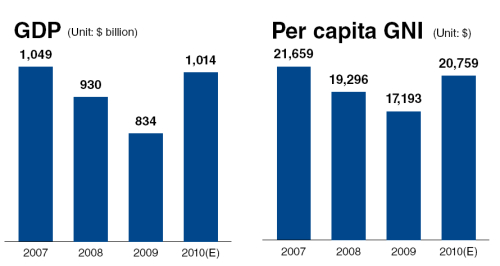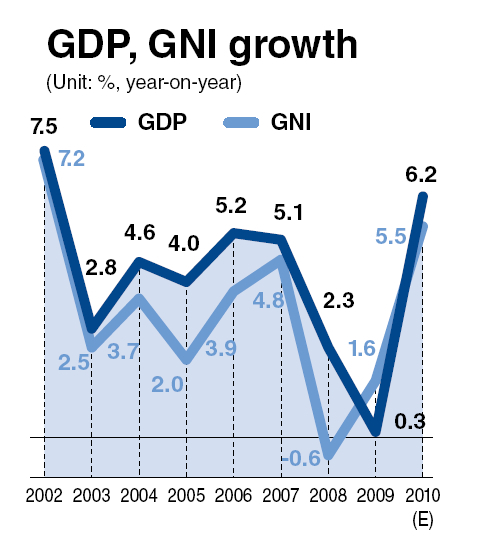Per capita income tops $20,000 for first time since 2007
Korea’s economy grew by 6.2 percent in 2010 in the fastest expansion for eight years, the central bank said Wednesday after revising an earlier estimate of 6.1 percent.
The bank also raised gross domestic product growth for 2009 to 0.3 percent from its earlier projection of 0.2 percent.


The country’s gross national income, reflecting the actual purchasing power of the population, rose 5.5 percent on-year in 2010, the fastest growth in eight years.
Its GNI per capita stood at $20,759 last year, up from $17,193 the previous year, the central bank added. The GNI per capita surpassed the $20,000 mark for the first time since 2007 as the economy grew and the local currency rose against the U.S. dollar. The Korean won appreciated 2.62 percent to the dollar last year.
“The growth of the Korean economy accelerated last year, helped by a sharp upturn in facilities investment, expanded exports and a pickup of growth in private consumption,” the Bank of Korea said in a statement.
The contribution of domestic demand to overall growth rose sharply in 2010, “pointing to self-sustaining recovery in the private sector,” said Kim Young-bae, director general of its economic statistics division.
“This year, the country’s GNI per capita is likely to reach a record high, given growth projections and the trend of the won’s gain to the greenback,” Kim said.
Quarterly growth has eased since the first quarter of 2010, but the central bank forecast that the economic growth rate is likely to accelerate to 1.3 percent in the first quarter of this year.
The data came as economic uncertainties linger while inflationary pressure is growing, leaving Korean policymakers facing difficulties in adjusting the pace and depth of policy normalization.
A recovery in advanced economies, including the United States, is expected to serve as an upside risk to economic growth, but the 9.0-magnitude earthquake and ensuing tsunami that devastated Japan on March 11 are viewed as adding to economic uncertainty.
In Korea, however, oil price gains and continued economic growth are exerting upward pressure on inflation. BOK Gov. Kim Choong-soo said keeping price stability is “the greatest challenge” facing the economy as consumer prices will likely remain high for some time.
The BOK has hiked the key rate in four steps to 3 percent since July last year from a record low of 2 percent.
Exports of goods, which account for about 50 percent of the local economy, grew 15.8 percent last year, up from an earlier estimate of 14.1 percent. Private spending, one of the main growth engines of the Korean economy, expanded 4.1 percent in 2010, the same pace as earlier expected.
Facility investment jumped 25 percent, better than an earlier 24.5 percent expansion, while construction investment declined 1.4 percent, better than an earlier estimate of a 2.3 percent contraction.
(From news reports)








![[Today’s K-pop] Blackpink’s Jennie, Lisa invited to Coachella as solo acts](http://res.heraldm.com/phpwas/restmb_idxmake.php?idx=644&simg=/content/image/2024/11/21/20241121050099_0.jpg)
